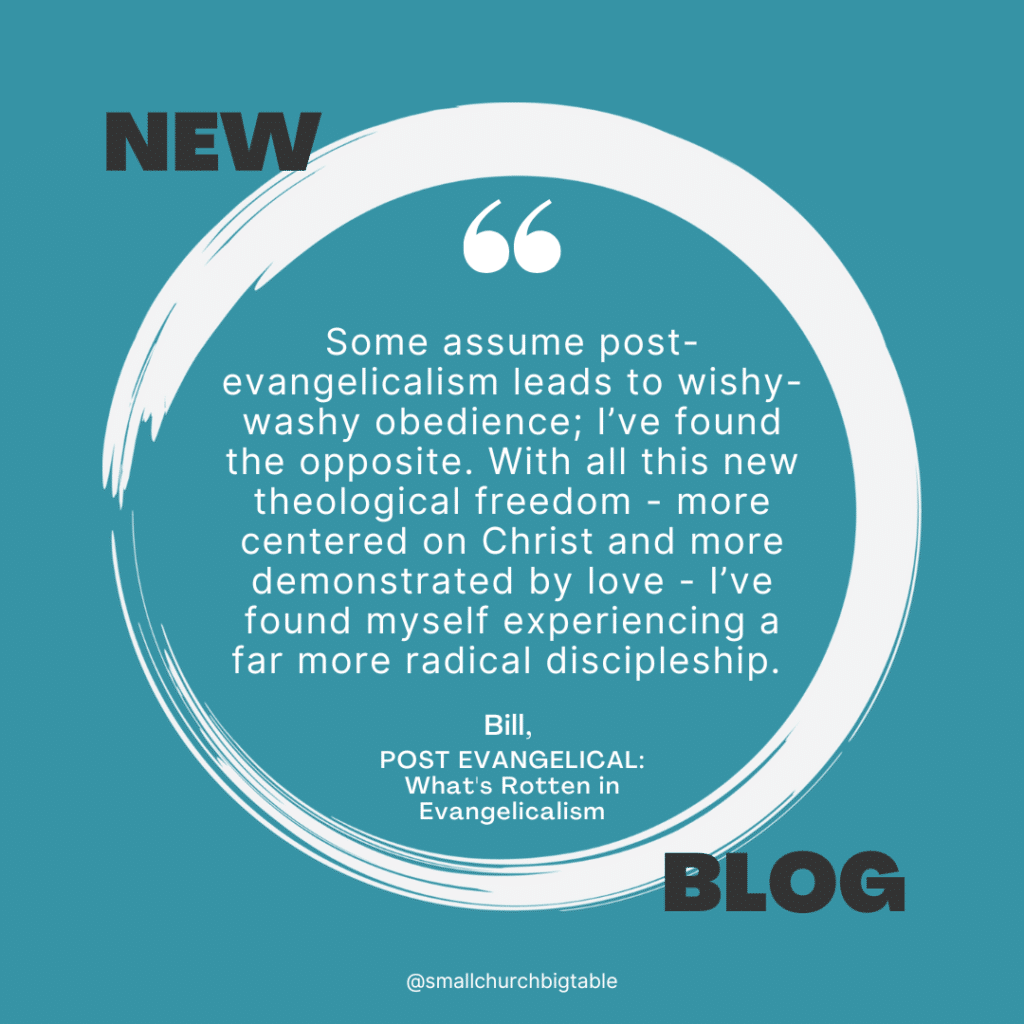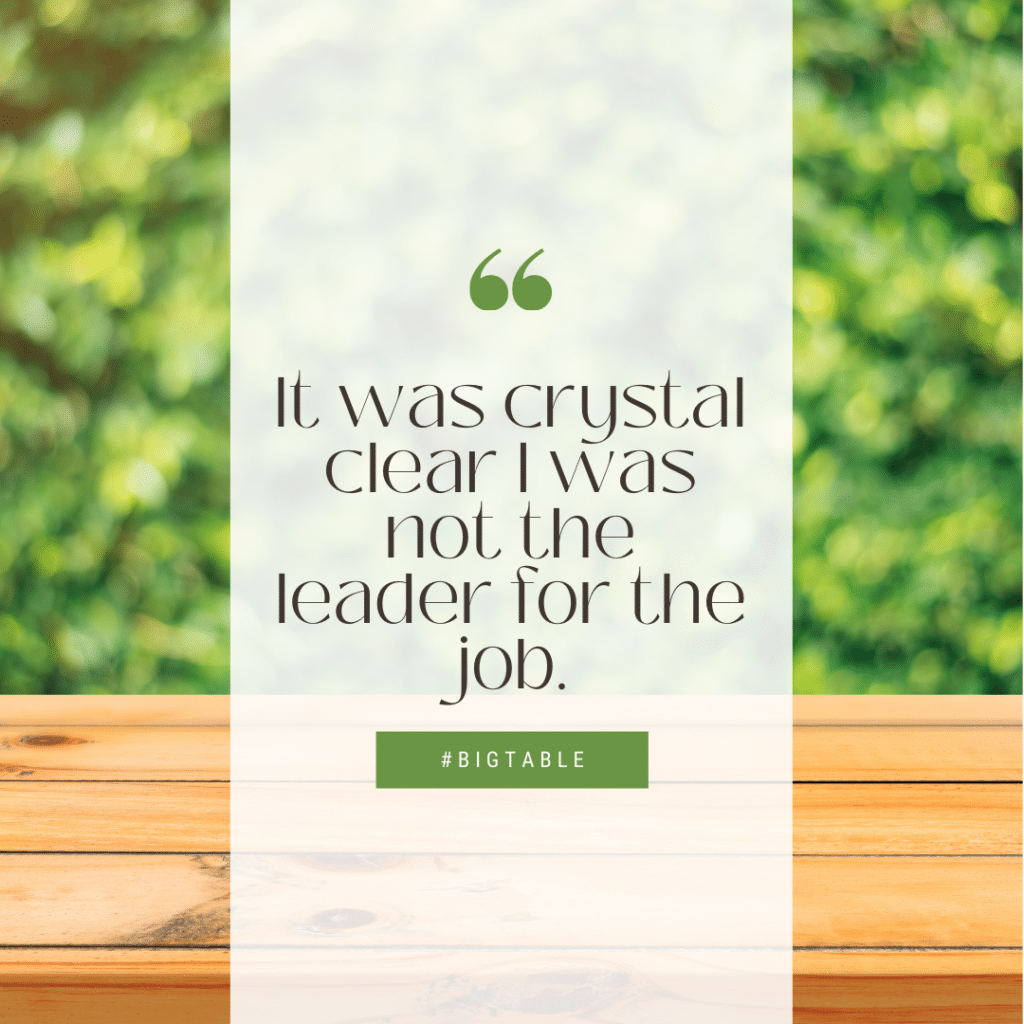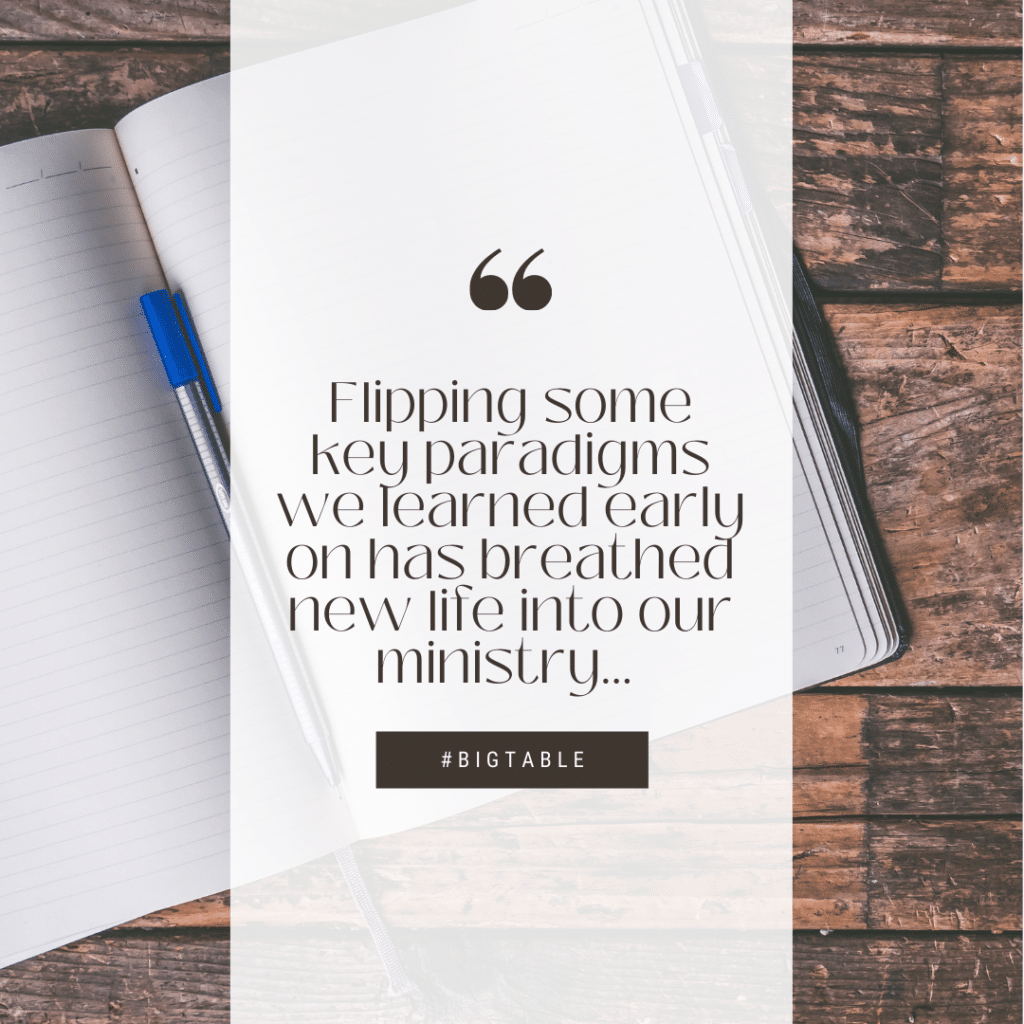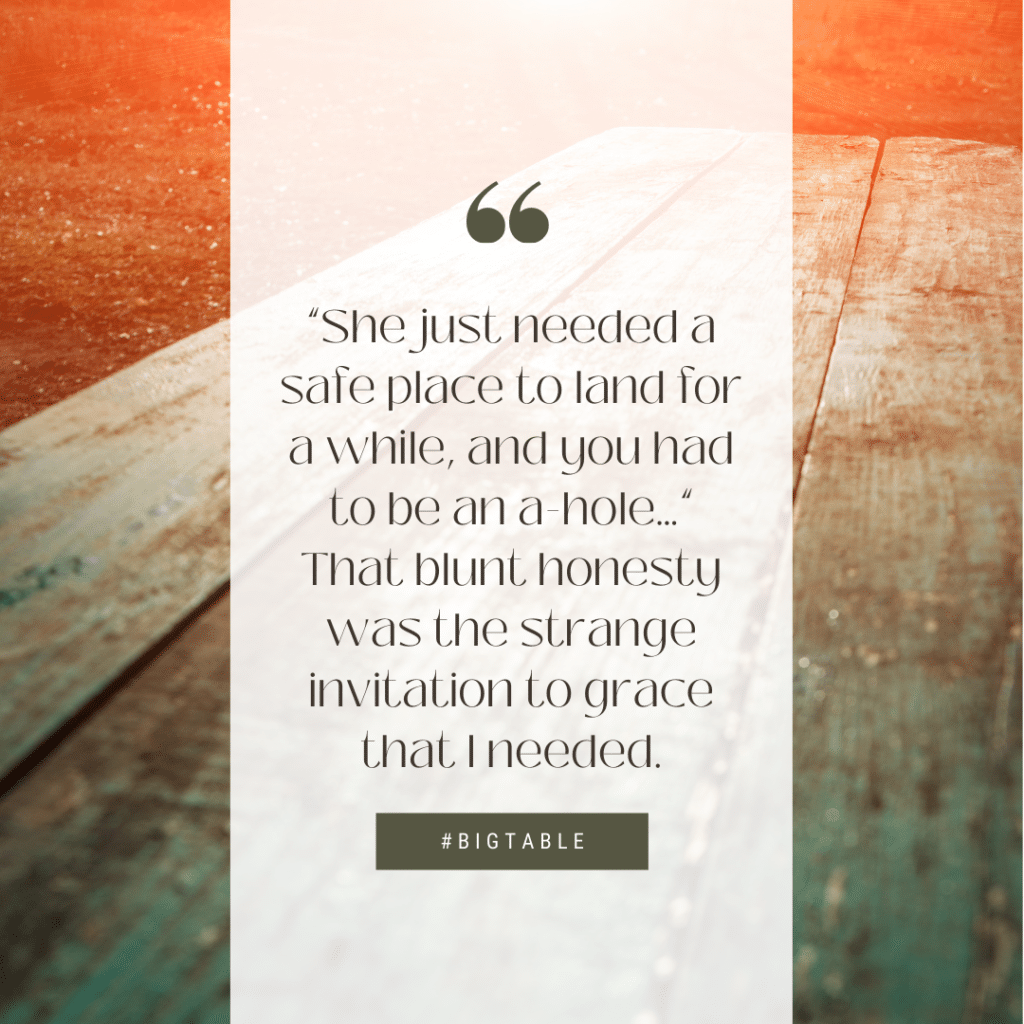We’re excited to be hosting a seminar at the Post Evangelical Collective gathering in Denver this coming week, Oct. 11-12! More on that below. But it got us thinking about our relationship with the evangelical church in the U.S. and what “post-evangelical” means to us anyway. So we first posted about the good things we’re bringing with us from our evangelical roots. Today’s is about what’s (frankly) rotten in evangelicalism that we’re leaving behind. And we’ll close it out in a few weeks with what we’re still hoping for, still needing.
So, what’s rotten in evangelicalism…
Perhaps it should be shared up front, we don’t write this with glee at getting to poke holes and criticize others. Everything we’re describing, we’ve been part of, and – like our friends who still describe themselves as evangelical – we honestly thought or tried to convince ourselves it was the way of Jesus. This is us, repenting.
Would you say there was a defining moment when you realized you were POST-evangelical? What was the trigger?
Bill:
It’s more than a decade ago, and I’m sitting in a room full of straight, white, male, evangelical leaders. They are denouncing me for wanting to build a Christ-centered community in another city because it didn’t exactly align with their vision for ministry. And I remember thinking, I want to love better than this. That was the beginning of my ‘slippery slope,’ my move out of traditional evangelicalism. I want to love better than this. [For a brilliant recasting of the whole idea of the ‘slippery slope,’ check out Peter Choi’s recent interview on the Space for Faith podcast.]
If that was the beginning of the journey, I recognized another milestone moment at a very different board meeting just a few months ago. The dozen or so remarkable leaders gathered included a transgender elder, a transgender deacon and three gay board members. As a great meeting unfolded, full of laughter, challenge and care, I noticed my conscience lamenting: I can’t believe the church has missed out on the leadership of these wise, faithful souls for so, so long.
Brenna:
Whew, so many thoughts and questions raised by the counterpoint of those two meetings!
Honestly, part of me wants to say I’ve never been fully included in evangelicalism. That they’ve never really wanted me, with the questions I ask and the gifts I exercise that just don’t fit the traditional box for women. Still, I tried to fit for a very long time. I tried to ignore the questions or ask them really carefully so I wouldn’t offend. So I wouldn’t get kicked out. (And was complicit in the exclusion and oppression of others as I did so.)
So the starting line for me? When I joined a church that was deliberately asking the questions that felt the most taboo, about gender, sexuality and inclusion, and agreed to help lead the process.
In the years after our shift toward LGBTQ+ affirmation, I remember preaching a few sermons that on the surface had nothing to do with inclusion. They were about race, justice, using feminine language like ‘mother’ for God… But the freedom I felt to go those places, raise those thoughts and questions in community, was all about the journey we’d been through together. We’d built trust, not just with each other, but with God, that there was enough space and strength in the relationship for growth and change. And we wanted to keep growing.
I knew I’d crossed over because of the freedom I felt to stand up there and name the questions and the problems honestly. To say let’s hear and learn from other voices, not just the straight white men who have always been centered in the evangelical tradition.
What do you see as some of the core theological shifts in post-evangelicalism? What’s rotten in evangelicalism that you’ve left behind?
Brenna:
I remember sitting with an intern, grinding away, trying to prepare a sermon the way he’d been taught in seminary. So he racked his brain, asking himself: what is THE MESSAGE this passage is meant to convey? This is the standard model: pastor as answer person, not question asker. Scripture as conversation stopper, when it could be conversation opener. Clearly, the pressure to get. it. right. was crushing him.
I invited him to start with honesty instead. What questions and emotions did the passage bring up for him? What could he imagine it bringing up for the congregation, in all its diversity? We shift toward midrash in how we read Scripture, toward turning the gem, when we consider and value multiple perspectives, opening an imaginative, creative, sacred space. Instead of looking for THE MESSAGE, we look for some key conversations. As Wil Gafney puts it, midrash and particularly “womanist interpretation makes room at the table of discourse for the perspectives of the least privileged among the community and the honored guest of any background.”
That welcome and even centering of the least privileged is key. Rachel Held Evans reminded us, “that a single biblical text can mean many things doesn’t mean it can mean anything… Anytime the Bible is used to justify the oppression and exploitation of others, we have strayed far from the God who brought the people of Israel out of Egypt, ‘out of the land of slavery’ (Exodus 20:2).”
So, midrash and explicit conversations about power and privilege. Those are the two shifts I’d highlight.
Bill:
I heartily agree with what Brenna has just summarized. The one thing I might add, which sounds kind of simplistic, is that God has just gotten so much better. Before, I had to do so many mental gymnastics to make sense of all of those awkward parts of the bible. What to do with a narrow-minded Jesus being a jerk to the Syrophoenician woman? Or a vengeful God commanding the Canaanite genocide? Or a fickle Spirit inspiring the condemnation of ‘men who lie with men’?
Far from ignoring these passages or tricking myself into thinking they weren’t saying what they were saying (which is what I did as an evangelical), now I take them more seriously. Now I face them without fear that my God is a bigot. Understanding how culture affected how God’s people told the story makes a huge difference. I see now that in Christ we see the fullness of God, not just a small spurt of grace that’s overshadowed by guilt, judgment and fear. I feel so much less defensive about the bible. And I find that God’s just, well, better, than in my old theology.
Ok, so now what about praxis? How does post-evangelicalism actually look different in a local church setting like City Church Long Beach?
Bill:
Let me reflect very personally on what it’s looked like to move into this new season of following Jesus as a post-evangelical.
I had some missionary friends actually say to me, “If we don’t focus on sin, hell, and judgment, then why would missionaries be motivated to go to the ends of the earth?” “Maybe,” I suggested, “people would go because of love?” And that’s what I find happening daily.
Instead of post-evangelicalism leading to wishy-washy obedience, I’ve found the opposite. With all this new freedom in my theology – more centered on Christ and more demonstrated by love – I’ve found myself experiencing a far more radical discipleship. We refinanced our house to build space on our property for a family in our community experiencing homelessness – that’s crazy! I followed the Spirit into wild conversations with the local witch and got to baptize her in our hot tub. I spend lots of time praying through the streets of the neighborhood in the middle of the night. And with each of these there is so much freedom, joy and even, dare I say it, love.
Brenna:
So much yes to all of that! To relating to God and people without all the fear and self-protection.
On a communal level, I think this looks like a centered v. bounded set, really embracing so many different voices and perspectives in community gatherings. We don’t need to control who’s in and who’s out, to tie everything up theologically in a neat bow. No, community is complicated. Reality is messy. Values do compete, and God is big and loving enough for all of it!
One of our most-loved sermon series of the past few years was called, “The Sermon I Always Wanted the Church to Hear.” We invited our preachers, who were all marginalized genders and women of color, to speak on anything they wanted to – anything they thought the church needed to hear. One of our first preachers pushed me on it a bit as they prepared – what if they upset people by saying what they really believed? What if there was backlash? My honest reply was, if that happens, what a great opportunity for discussion and growth that will be for us!
How have you seen the journey towards being post-evangelical impact how you relate to people?
Brenna:
My first thought hearing this question was about how I relate to more traditional evangelicals now, the folks I felt like I basically had to “come out” to as having shifting beliefs that were also shifting how I lived and led.
Becoming post-evangelical has been a process of growing up for me spiritually. It’s that classic dynamic therapists talk about, navigating the tensions between self-differentiation and connection. I’ve had to learn to risk pushback and even rejection to be honest about who I am, what I value, what I wonder about, while also staying humble, hopeful and open that people may surprise me with their ability to stretch and love across differences.
And people have surprised me! I shared one particular instance that felt practically miraculous with my therapist, and her response struck me as incredibly insightful. “So often people just haven’t been taught how to hold their beliefs with both conviction and love. You gave them a chance and even some gentle coaching on what you were hoping for, and look how they rose to the occasion.”
I wonder how different the evangelical church might look if more leaders took some risks to share their whole selves, their questions and concerns and changing beliefs. What if more people are ready than we think? What if they just need us to give them a chance and show them a different way forward?
Bill:
For me, looking back, fear, judgment, and hidden agendas regularly informed how my evangelical self related to those who saw life differently than I did. I cannot overstate how huge it has been to move away from that mindset.
Instead of the anxiety of don’t let them influence me or (even worse) how can I turn this conversation to achieve my secret God agenda, over and over I now encounter a strange relational calm. It blankets me when I speak with those who I would traditionally have called ‘non-Christian.’ It’s like the Holy Spirit is saying, It’s okay, Bill. You can be present to them. You can love them and not worry about the rest.
There’s a Greek word that captures this new way of relating: eudokeo. Literally it means ‘good thought’ but it’s traditionally translated ‘delight.’ It’s how the Father thinks of the Son (Mk 1:11), and how God feels about choosing us before creation began (Eph 1:5), it’s the joy a newborn brings to parents (Lk 1:14), it’s the openness of how Paul approached the Thessalonians (1 Thes 2:8) and how Jesus exults over humble people (Lk 10:21). This is pure delight, true joy at being with someone else, regardless of their religion, culture, sexual or gender identity, etc.
Imagine the freedom this new way of seeing people has been for me? I’m that crazy extrovert who has, at present, the contact information of 286 neighbors in my phone. And now I get to just love them?! Are you kidding me! How fun is that! And it doesn’t mean I talk about Jesus a second less, but now it’s not with an agenda – it’s with love and freedom. I get to gladly inquire about others’ spiritual journeys and share my own – and see the kindom** of God come without manipulation or connivery.
** Term originating with Ada María Isasi-Díaz
So, b&b, those are the shifts you’ve already made, away from what’s rotten in evangelicalism and towards what’s fresh and life giving. What do you find yourself still hoping for? What big questions and concerns are leading you forward?
That post is coming soon! Over the next week, we’ll be hanging out with amazing folks in Denver from the Post Evangelical Collective gathering, W/ Collective and Launchpad Partners, and Faith + Justice Network. Excited to incorporate what we learn from these fabulous friends!
Want to join us at our workshop with the Post Evangelical Collective gathering? This is a gathering of pastors, artists, and other church leaders in the post-evangelical space who come together in order to connect, share resources, learn from one another, and know that you’re not alone as you seek to lead the church into new spaces. Folks will get to hear from great thought leaders like Gail Song Bantum, David Gushee and Peter Choi. And we’ll specifically be leading a workshop on how to dismantle toxic leadership. You can find out more information and register here.




How does Romans 1 relate to the thinking you are expressing here, old friend?
Tom – thanks for being willing to engage! When we had our LGBTQ Study Team (a group of leaders from both conservative and progressive theological backgrounds at our church) we spent a lot of time on Romans 1. I might articulate a few things differently now, but here’s the shorthand for some of the progressive arguments around Romans 1.: https://lgbtqconversations.wordpress.com/2017/04/03/best-progressive-arguments-on-romans-1-part-3/
Hey Bill. Thanks for the written piece “What’s Rotten in Evangelism”. I think one of the major concerns that is rocking the evangelism boat so to speak in the redefining of how scripture is being re-interpreted today. Over the years … we Christians have too often accepted a pervasive societal prejudice and read it back into scripture. This is why it is difficult to “unlearn” what has been ingrained in me over the years from the evangelical world. It rarely occurred to me that scripture could be interpreted from different perspective outside of the pervasive societal norms. Now I’m trying to look at the bible in its cultural context and through the lens of Jesus redemptive life and ministry. Maybe the bible was never meant to be taken as “inerrant” and “infallible” – as least as defined by the evangelical church?
As always, your insights are keen, gracious, and helpful. I don’t know what your theological training was like, but 100% of the systematic theology we read for my MDiv was from straight, White men… do you think that might be just a bit biased? Just reading theology from different kinds of people has opened my eyes so much to the richness in the text that was obscured by having only one perspective before.
Yep. I have to agree the majority of my theological learning came from the predominately white/male/ patriarchy oriented sources. In summary I was immersed in a dominated white supremacist culture that lates down the rules and expectations of what it meant to be evangelical. In fact up until early 2000’s I was exposed Christian teachings by only one non-white author. Related to human sexuality – I approached the scriptures with a bias pre-deposed mindset formulated by the predominated heterosexual culture. As I read books and conversed with gay men/women I was exposed to the other side of the argument – how they interpreted the scriptures through their gay paradigm. Very much how black people interpreted scriptures through the lens of slavery and Jim Crow and civil rights (emphasis on justice and not “saving of the soul”. I believe the Spirit of God guides us through the scriptures in the light of the personal and social context we are emerged within. To me … this is a proper step towards diversity and inclusion